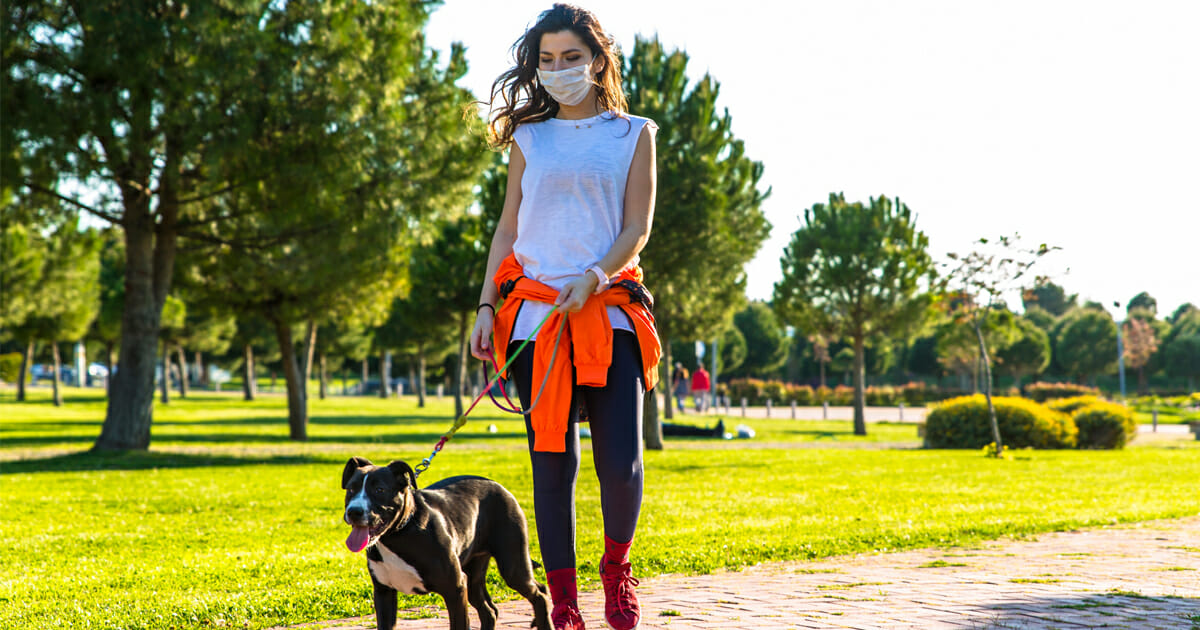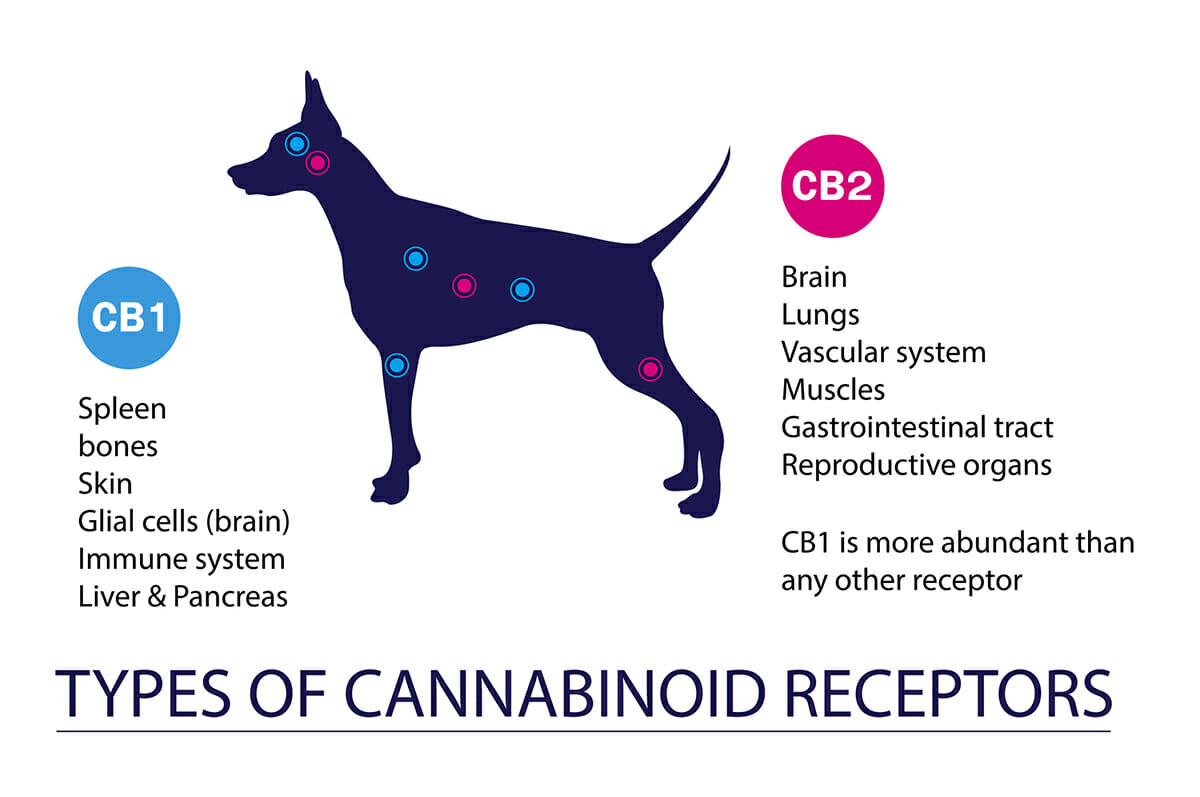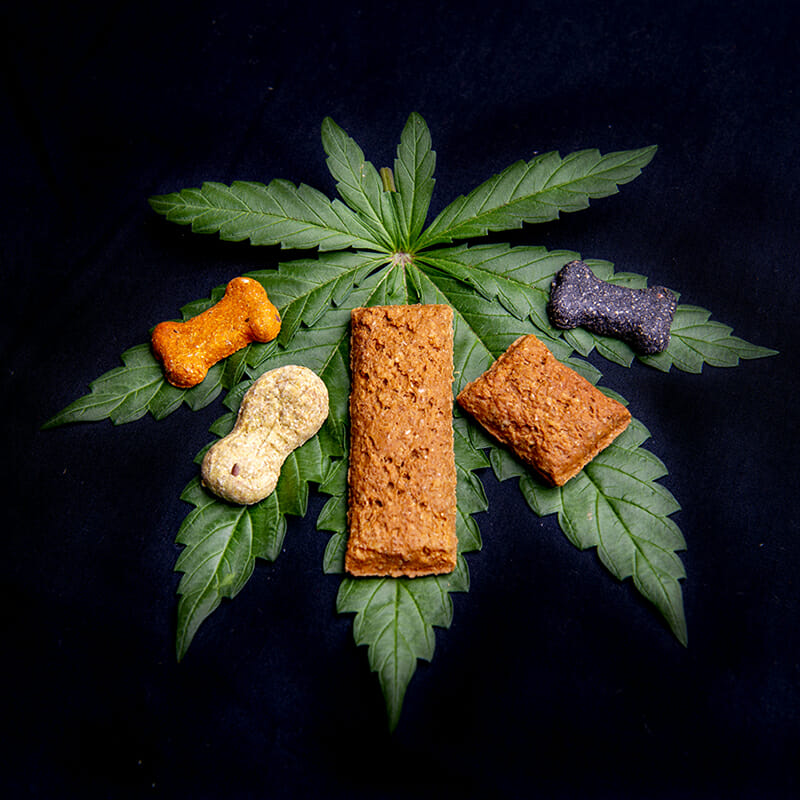Treating Your Dog’s Anxiety With CBD Products for Canines
Written by Chris Weatherall on Jul 15, 2020
Modern pet owners are always looking for new ways to improve their pets’ quality of life, treat ailments, and ensure long, happy lives for their pets with healthy and reliable remedies. Generally, pet owners tend to prefer feeding and medicating their pets along similar lines to how they treat themselves. Pet owners who eat healthy, all-natural diets tend to prefer healthy and all-natural foods and treats for their pets.
CBD for Pet Anxiety
It’s no surprise that as cannabidiol (CBD) products have grown increasingly popular for human consumption, dog owners across the country are more receptive than ever to the idea of treating their dogs’ ailments with CBD that is manufactured for dogs. Most people now know about the many benefits of CBD for humans when it comes to pain management and anxiety treatment, but what does CBD do for an animal? Because of the best-known properties of CBD, it’s easy to find yourself wondering if this plant could benefit your furry friend, too.
In fact, CBD products for dogs with anxiety have been shown to produce positive results.[1]Greb, A., & Puschner, B. (2018). Cannabinoid treats as adjunctive therapy for pets: gaps in our knowledge, Toxicology Communications, 2:1, 10-14. https://doi.org/10.1080/24734306.2018.1434470 However, while there are many similarities in the ways people and pets receive treatment for the ailments that affect them every day, there are many key issues surrounding the question of CBD for dog anxiety that require pet owners’ consideration.
As mentioned, one of the ailments most commonly treated with CBD among humans in the US is anxiety, a condition that everyone experiences to a degree at some point. Some live with symptoms of anxiety on a constant basis and with varying degrees of severity. CBD can effectively treat some of the symptoms of anxiety disorders[2]Crippa, J. A. S., Derenusson, G. N., Ferrari, T. B., Wichert-Ana, L., Duran, F. L., Martin-Santos, R., … & Hallak, J. E. C. (2011). Neural basis of anxiolytic effects of cannabidiol (CBD) … Continue reading in some patients and do so without incurring the typical side effects common with most psychiatric medications. Dog owners who have seen symptoms of anxiety in their dogs may wonder if CBD could help their pets cope with anxiety better.
How Do Dogs Experience Anxiety?
Dogs are incredibly empathic creatures, and studies show that dogs can mirror the psychological symptoms and moods of their owners.[3]Sundman, AS., Van Poucke, E., Svensson Holm, AC. et al. (2019). Long-term stress levels are synchronized in dogs and their owners. Sci Rep 9, 7391. https://doi.org/10.1038/s41598-019-43851-x Dogs can perceive the moods of people around them, and this influences them to an astounding degree. When it comes to anxiety, stressed out dogs in turn create stressed out owners. As owners worry about their pets’ wellbeing, their pets pick up on their intensified stress levels and their anxiety worsens in turn. This can create a vicious cycle that is difficult to break.

Even without a stressful environment, dogs can still develop anxiety disorders that can affect their quality of life. Especially for dogs that grew up during the COVID-19 pandemic, separation anxiety can be a common culprit. Dogs that aren’t used to their owners leaving home every day can be extremely anxious when their owners suddenly start going to work for 6-8 hours at a time. Separation anxiety can show itself in your dog’s behavior (usually evident in whining/barking when you leave the house, destructiveness, or accidents while you are gone) as well as in changes in appetite.
Another common cause of a dog’s anxiety is past life experiences. If you adopted your dog and aren’t sure what their first few months or even years of life were like, you are not alone. This kind act can leave many owners wondering why their dogs are afraid of certain things,[4]Coy, A. E., & Green, J. D. (2018). Treating pets well: The role of attachment anxiety and avoidance. Hum. Anim. Interact. Bull, 6, 14-31. … Continue reading and in turn, dealing with anxiety that is difficult to treat. Sometimes, this is a normal part of your dog adjusting to a new environment. But if your dog has been suffering from anxiety for an extended period of time, it may be time to take additional steps to curb the issue.
Anxiety Can Be Dangerous for Dogs
Anxiety on its own is an unpleasant experience, but, when dogs experience anxiety for prolonged periods of time, they can start to develop unwanted behaviors that may put their lives at risk. Anxious dogs may turn to destructive or even aggressive behavior. Owners who witness displays of these behaviors may not be willing to explore remedies to curb these problematic behaviors and instead relinquish their pets. This contributes to the number of euthanized dogs in the country, and it’s sad and unfortunate that otherwise healthy dogs are subjected to what is essentially abandonment and death due to behaviors they developed at no fault of their own.
Dogs can experience acute episodes of anxiety and also display consistent anxious behaviors, such as sensitivity to noise, hostility toward new people or other dogs, or anxious chewing on toys and household objects. Dogs cannot process their emotions and psychological issues the same way as people can, so they can depend on their human partners to guide them through difficult times and provide them with the food and treatments they need to lead healthy and fulfilling lives.[5]Correia-Caeiro, C., Guo, K., & Mills, D. (2021). Bodily emotional expressions are a primary source of information for dogs, but not for humans. Animal cognition, 24(2), 267-279. … Continue reading Anxiety can also jeopardize the dogs’ health. Prolonged anxiety can leave dogs more vulnerable to physical illness, the symptoms of which can exacerbate anxiety even further and lead to extensive medical issues that may be difficult to treat.[6]Dreschel, N. A. (2010). The effects of fear and anxiety on health and lifespan in pet dogs. Applied Animal Behaviour Science, 125(3-4), 157-162. https://doi.org/10.3390/ijerph14050483
Can CBD Calm My Dog?

CBD offers an alternative to typical anxiety treatment, which often consists of a prescription for a selective serotonin reuptake inhibitor (SSRI), many of which are known to cause adverse side effects and medical risks. It’s not entirely clear how CBD works to alleviate the symptoms of anxiety, but available research from the National Institute on Drug Abuse (NIDA)[7]Volkow, N. D. (2015). The Biology and Potential Therapeutic Effects of Cannabidiol. National Institute on Drug Abuse (NIDA) Archives. Retrieved March 30, 2022, from … Continue reading suggests that CBD activates CB1 receptors in the central nervous system and CB2 receptors in the peripheral nervous system, altering serotonin signals. Low serotonin levels can cause depression and symptoms of anxiety.
Just like it does in humans, CBD can be helpful in treating anxiety in dogs, as well. Though research is relatively new for CBD use in dogs, renowned institutions have completed important research in the area and the studies that have been done have led many scientists to believe that benefits definitely exist. For example, Colorado State University’s recent study[8]Guiden, M. (2018). Preliminary data from CBD clinical trials ‘promising’. News from the College of Veterinary Medicine and Biomedical Sciences. Retrieved March 30, 2022, from … Continue reading showed exciting findings when it comes to treating dogs with CBD. Dr. Stephanie McGrath, a neurologist at CSU’s James L. Voss Veterinary Teaching Hospital, revealed the results of a study performed to assess the use of CBD in dogs with epilepsy. In the study, sixteen dogs were enrolled in total. Nine of the dogs were treated with CBD, while seven of them were given a placebo. The results showed that 89% of the dogs treated with CBD had a reduction in the frequency of their epileptic seizures.
Do Vets Recommend CBD Oil for Dogs?
It’s important to note that the legal status of cannabis and cannabis-related products remain in a legal gray area due to its illegal status at the federal level and the decriminalization and legalization seen at the state and local level throughout the country. This legal turmoil surrounding cannabis had bled into discussions of CBD products, despite the fact that CBD can be derived from hemp, cannabis’ non-psychoactive sister plant. To add to the confusion, CBD products containing less than .3% THC are legal at the federal level but remain illegal in some states.
While many doctors in states that have legalized or decriminalized medical cannabis may readily suggest CBD as a potential treatment for their patients’ anxiety symptoms, it remains illegal for veterinarians in any state to recommend or prescribe CBD products to their patients. Some veterinarians will not even discuss CBD for dogs or other CBD-related issues with their patients to avoid potential professional consequences. However, there is strong data supporting the fact that many vets do support[9]Kogan L., Schoenfeld-Tacher, R., Hellyer, P., and Rishniw, M. (2019) US Veterinarians’ Knowledge, Experience, and Perception Regarding the Use of Cannabidiol for Canine Medical Conditions. Front. … Continue reading the use of CBD in dogs, despite it not being legal to prescribe just yet. This means it falls to dog owners to determine if CBD is right for their pets.
How to Determine the Appropriate CBD Dose for Your Dog
The legal questions and misinformation circulating about CBD for dogs are certainly obstacles for many pet owners who may be interested in CBD for dog anxiety, but the reality is there is no firm guidance when it comes to dosing and dosage strength. A study conducted by the Cornell University College of Veterinary Medicine seems to indicate that CBD treatments can be both safe and effective for dogs, and determining appropriate dosage comes down to the half-life of CBD, or how long it lasts in the body once consumed.
The study, which was conducted in 2018, aimed to examine the safety and efficacy of CBD in dogs with osteoarthritis, a painful disease that can make exercise uncomfortable and a dog’s favorite walks feel more like a chore. In the end, the results of the study were statistically significant and were positive news when it comes to CBD for dogs. Just 2mg of CBD administered every 12 hours had been shown to alleviate pain and increase activity in the study’s dogs, compared with the dogs that were given a placebo. Additionally, no negative side effects were found in the dogs participating in this study.
As a result, even more vets have begun to support the use of CBD in pets.[10]Gamble LJ, Boesch JM, Frye CW, Schwark WS, Mann S, Wolfe L, Brown H, Berthelsen ES, Wakshlag JJ. (2018) Pharmacokinetics, Safety, and Clinical Efficacy of Cannabidiol Treatment in Osteoarthritic … Continue reading Even though they can’t yet prescribe a CBD product for your dog, CBD-friendly vets stress that administering a safe dose of CBD for your dog is critical, and it is advisable to schedule a consult before introducing any new supplement to your pet. So, is CBD toxic for pets? While THC can be harmful to dogs, proper dosage of CBD has not shown any harmful side effects.
What Is the Best CBD Oil to Give Your Dog?
While human-friendly CBD oil is considered generally safe to give your dog, dosing can be an issue. For that reason, it is best to consider one of the many dedicated CBD dog treats on the market. However, these can also come in varying doses, and it is critical to be aware of these variances as you begin your CBD journey.
That’s why, if you’re interested in exploring CBD for dog anxiety, the first step is to determine an appropriate dose[11]Jones, S. (2022). CBD Dosage for Dogs: Clearing Up the Confusion. Canine Journal. Retrieved March 30, 2022, from https://www.caninejournal.com/cbd-dosage-for-dogs/ for your canine companion. This can be difficult as companies that produce CBD products include CBD oils of varying levels of potency. High-potency CBD treats for dog anxiety could cause problems in small dogs whereas low-potency CBD treats for dogs may not produce any noticeable improvement in larger breeds.
While considering your dog’s size and weight, you must also take your pet’s underlying health conditions and regular activity level into account. If your veterinarian is willing to discuss CBD supplements for your dog, it’s worth asking their advice when it comes to adding CBD to your dog’s treatment schedule.
Starting With CBD Dog Treats for Anxiety
Once you have decided to try CBD treats for dog anxiety,[12]American Veterinary Medical Association (AVMA) (2019) Cannabis Use and Pets. Retrieved March 30, 2022, from https://www.avma.org/resources-tools/veterinarians-and-public-health/cannabis-use-and-pets you should aim to start small and then work up to the manufacturer’s recommended dosage. For example, a company may produce 75mg CBD treats for dogs of smaller breeds and 300mg or more for larger breeds. It’s also vital to conduct thorough research on the manufacturer to ensure the CBD treats for dog anxiety do not contain any hazardous ingredients. Unfortunately, the lack of regulation in the CBD product market has allowed many questionable products to find their way to store shelves. The best CBD dog treats should have similar ingredients to the regular treats you feed your dog and responsibly sourced CBD oil from a reputable manufacturer.
Your dog’s activity level[13]Morris, E. M., Kitts-Morgan, S. E., Spangler, D. M., Gebert, J., Vanzant, E. S., McLeod, K. R., & Harmon, D. L. (2021). Feeding cannabidiol (CBD)-containing treats did not affect canine daily … Continue reading can help you determine how quickly your pet will metabolize the CBD in their treats. Very active dogs that get long walks or spend time at dog parks may require larger doses, as they will metabolize them faster than more sedentary dogs that love their daily naps. Underlying health issues such as liver or kidney problems will also affect the metabolization rate and should be talked about with your vet beforehand.

A Calmer Life for You and Your Pet

You love your pet, so you certainly want the best for them. If you think that CBD could improve your pet’s anxiety symptoms, then it’s important to discuss your thoughts with your veterinarian and do some careful research before giving your dog CBD treats. Once you feel comfortable with the product you have purchased, start with a low dose, and pay close attention to how your dog’s behavior changes. If you are worried about adverse side effects or notice any worrisome changes in your dog’s behavior, contact your veterinarian right away.
When your dog suffers from anxiety, you do too.[14]Rusu, Alina Simona; Costea-Barlutiu, Carmen; and Turner, Dennis C. (2019) “Interpersonal and Pet Attachment, Empathy toward Animals, and Anthropomorphism: An Investigation of Pet Owners in … Continue reading It can be unbearable to watch your beloved pet shake with fear from life’s everyday experiences, or cry when you leave the house. Luckily, heavy pharmaceutical prescriptions aren’t the only option when it comes to calming your anxious pup. CBD products for dogs can be a terrific option for treating their anxiety, and there’s truly no time like the present to try something that might benefit your and your dog’s lives forever.

I’m a kid at heart disguised as a cannabis researcher and business owner. I’ve always enjoyed providing insight in the form of reviews (anime, video games, etc.) So, when the cannabis industry took off, it sparked my interest in researching, reviewing, and chronicling all things within. When I’m not researching, I’m spending time with my family, riding my motorcycle, and finding new entrepreneurial pursuits.
Sources:
| ↑1 | Greb, A., & Puschner, B. (2018). Cannabinoid treats as adjunctive therapy for pets: gaps in our knowledge, Toxicology Communications, 2:1, 10-14. https://doi.org/10.1080/24734306.2018.1434470 |
|---|---|
| ↑2 | Crippa, J. A. S., Derenusson, G. N., Ferrari, T. B., Wichert-Ana, L., Duran, F. L., Martin-Santos, R., … & Hallak, J. E. C. (2011). Neural basis of anxiolytic effects of cannabidiol (CBD) in generalized social anxiety disorder: a preliminary report. Journal of psychopharmacology, 25(1), 121-130. https://doi.org/10.1177%2F0269881110379283 |
| ↑3 | Sundman, AS., Van Poucke, E., Svensson Holm, AC. et al. (2019). Long-term stress levels are synchronized in dogs and their owners. Sci Rep 9, 7391. https://doi.org/10.1038/s41598-019-43851-x |
| ↑4 | Coy, A. E., & Green, J. D. (2018). Treating pets well: The role of attachment anxiety and avoidance. Hum. Anim. Interact. Bull, 6, 14-31. https://www.researchgate.net/publication/331397948_Treating_Pets_Well_The_Role_of_Attachment_Anxiety_and_Avoidance |
| ↑5 | Correia-Caeiro, C., Guo, K., & Mills, D. (2021). Bodily emotional expressions are a primary source of information for dogs, but not for humans. Animal cognition, 24(2), 267-279. https://doi.org/10.1007/s10071-021-01471-x |
| ↑6 | Dreschel, N. A. (2010). The effects of fear and anxiety on health and lifespan in pet dogs. Applied Animal Behaviour Science, 125(3-4), 157-162. https://doi.org/10.3390/ijerph14050483 |
| ↑7 | Volkow, N. D. (2015). The Biology and Potential Therapeutic Effects of Cannabidiol. National Institute on Drug Abuse (NIDA) Archives. Retrieved March 30, 2022, from https://archives.drugabuse.gov/testimonies/2015/biology-potential-therapeutic-effects-cannabidiol |
| ↑8 | Guiden, M. (2018). Preliminary data from CBD clinical trials ‘promising’. News from the College of Veterinary Medicine and Biomedical Sciences. Retrieved March 30, 2022, from https://cvmbs.source.colostate.edu/preliminary-data-from-cbd-clinical-trials-promising/ |
| ↑9 | Kogan L., Schoenfeld-Tacher, R., Hellyer, P., and Rishniw, M. (2019) US Veterinarians’ Knowledge, Experience, and Perception Regarding the Use of Cannabidiol for Canine Medical Conditions. Front. Vet. Sci. 5:338. https://doi.org/10.3389/fvets.2018.00338 |
| ↑10 | Gamble LJ, Boesch JM, Frye CW, Schwark WS, Mann S, Wolfe L, Brown H, Berthelsen ES, Wakshlag JJ. (2018) Pharmacokinetics, Safety, and Clinical Efficacy of Cannabidiol Treatment in Osteoarthritic Dogs. Front Vet Sci.5, 165. https://dx.doi.org/10.3389%2Ffvets.2018.00165 |
| ↑11 | Jones, S. (2022). CBD Dosage for Dogs: Clearing Up the Confusion. Canine Journal. Retrieved March 30, 2022, from https://www.caninejournal.com/cbd-dosage-for-dogs/ |
| ↑12 | American Veterinary Medical Association (AVMA) (2019) Cannabis Use and Pets. Retrieved March 30, 2022, from https://www.avma.org/resources-tools/veterinarians-and-public-health/cannabis-use-and-pets |
| ↑13 | Morris, E. M., Kitts-Morgan, S. E., Spangler, D. M., Gebert, J., Vanzant, E. S., McLeod, K. R., & Harmon, D. L. (2021). Feeding cannabidiol (CBD)-containing treats did not affect canine daily voluntary activity. Frontiers in Veterinary Science, 8. https://doi.org/10.3389/fvets.2021.645667 |
| ↑14 | Rusu, Alina Simona; Costea-Barlutiu, Carmen; and Turner, Dennis C. (2019) “Interpersonal and Pet Attachment, Empathy toward Animals, and Anthropomorphism: An Investigation of Pet Owners in Romania,” People and Animals: The International Journal of Research and Practice:2, 1:6. https://docs.lib.purdue.edu/paij/vol2/iss1/6 |






